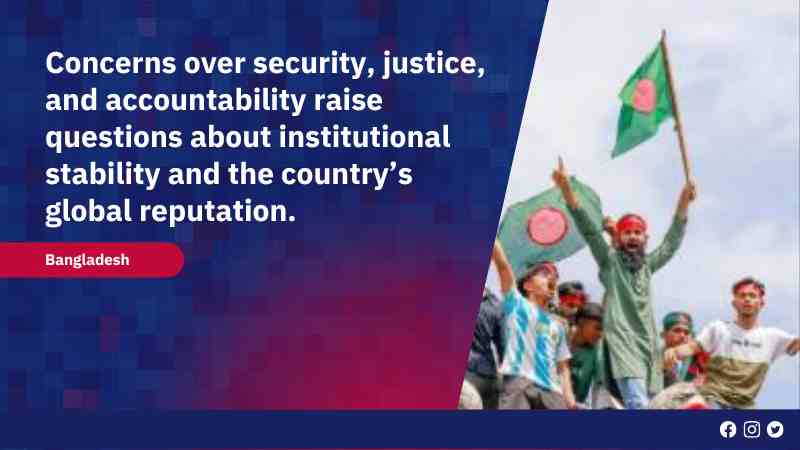Bangladesh is facing increasing scrutiny over its governance and justice system following criticism directed at the administration led by Nobel laureate Dr. Muhammad Yunus. The country has witnessed growing concerns about law enforcement’s ability to manage internal security, particularly in response to reported planned attacks and unrest.
Observers argue that the administration’s perceived inability to contain these challenges raises serious questions about institutional stability, justice, and accountability. Critics highlight that an ineffective response to security threats could damage Bangladesh’s international standing, potentially affecting investor confidence and diplomatic ties.
The unfolding situation is fueling debates over whether the justice system in Bangladesh operates independently or under political influence. If these concerns persist, Bangladesh may struggle to maintain its image as a stable and progressive economy. The international community will be closely watching how the government addresses these pressing issues to restore confidence in the country’s governance.
Security Concerns and Governance Challenges
Recent incidents, including reported planned attacks and targeted violence, have drawn attention to Bangladesh’s internal security mechanisms. Human rights groups and opposition parties claim that law enforcement agencies have failed to act decisively, allowing instability to persist. In contrast, government officials maintain that security forces are actively working to restore law and order, dismissing allegations of negligence.
Justice System Under Question
The growing concerns over law enforcement’s response have fueled broader discussions about the state of Bangladesh’s justice system. Critics argue that a lack of swift action in recent cases signals an erosion of judicial independence. Organizations such as Amnesty International and Human Rights Watch have previously raised concerns about political interference in legal proceedings, calling for greater transparency and accountability.
International Reactions and Diplomatic Implications
Bangladesh’s governance issues are drawing reactions from the international community, particularly from regional partners, the United Nations, and global financial institutions. Analysts warn that if security challenges persist, it could impact foreign direct investment (FDI) and strain diplomatic relations with key allies. Additionally, Bangladesh’s economy, which has shown resilience in recent years, may suffer setbacks if investor confidence declines due to instability.
Government’s Response and Path Forward
Despite the criticism, the administration has reassured the public and international stakeholders that it is taking necessary measures to improve governance and security. Officials have emphasized efforts to strengthen law enforcement, modernize the judiciary, and enhance counterterrorism initiatives.
Experts suggest that Bangladesh must prioritize:
- Judicial Reforms – Ensuring judicial independence and transparency.
- Strengthening Security Forces – Enhancing intelligence-sharing and law enforcement capabilities.
- Diplomatic Engagement – Addressing international concerns to maintain economic and political stability.

